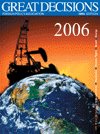
It's spring, which means that it's Great Decisions season. "Great Decisions" is a series of eight foreign policy topics selected by the Foreign Policy Association. The FPA commissions very solid articles about each topic, then assembles the articles into booklets that are used by a thousand groups around the country to explore the topics. It's an excellent program, definitely worth engaging.
Here are this year's eight topics, with the blurbs about each provided by the FPA:
UN Reform: Both its supporters and critics recognize the United Nations as an organization in need of critical changes. Disagreements about intervention in Iraq, the oil-for-food-scandal and management issues have fueled the debate about the UN's ability to take on global challenges. What reforms are needed to make the UN more effective?
US and Iran: The election of Iran's conservative president has raised concern that hardliners will shape policies against U.S. interests. How can the U.S. check Iran's influence in Iraq, Afghanistan and other countries in the region? How will the U.S. and the international community mitigate the crisis over Iran's nuclear ambitions?
Energy: Energy supply and consumption have a significant impact on U.S. politics and economy. Is reliance on Middle East oil making the U.S. vulnerable to political influence and economic peril? How will the rapidly increasing consumption of energy by countries like China affect the U.S. and the world?
Brazil: After decades of economic volatility, Brazil is finally enjoying steady growth, despite a political scandal surrounding the administration of President Luiz Inacio Lula da Silva. Will Brazil continue on course toward stability? What impact will the scandal have on Brazil's economy, on its South American neighbors and on the U.S.?
China and India -- Partners or Competitors? China and India have emerged on the world stage, after following different paths toward rapid economic growth. Will China and India work closer together or compete with each other to become major world powers? How will their growth affect the U.S. economy and strategic interests?
Human Rights in the Age of Terrorism: Terrorist attacks in Western nations have forced governments to adopt measures, sometimes controversial, to combat terrorism. While security is a priority for all societies, debate has arisen about how far some of these measures should reach. Can human rights and civil liberties be fully protected in an age of terrorism?
Turkey: Turkey has long sought membership in the European Union. Roadblocks remain, as several European countries are wary of Turkey's candidacy. Could Turkey's membership in the EU help Western relations with the Islamic world? Or could the possible rejection of Turkey cause an even wider divide?
Global Health -- Pandemics and Security: Post 9/11, security and public health authorities are planning for epidemiological disasters as never before. What does that planning encompass, and how effective is it likely to be? What lessons can be learned from reactions to the global AIDS pandemic and its growing impact on the developing world?
One of the biggest "Great Decisions" series is run by the Indiana Council on World Affairs, meeting every Tuesday evening in February and March at Butler University (room still to be decided). ICWA has an excellent line-up this spring:
Feb 7 -- UN Reform, featuring Ed DeLaney, Partner with the law firm of Delaney & DeLaney
Feb 14 -- US & Iran, featuring Sean Foley, Assistant Professor of History, DePauw University
Feb 21 -- Energy, featuring Peter Grossman, Clarence Professor of Economics, Butler
University
Feb 28 -- Pandemics, featuring Sarah Archer, DrPH, RN, Public Health and Humanitarian Assistance Consultant
Mar 7 -- Brazil, featuring Pedro Cardoso, Senior Systems Analyst, Geo-Pol, “Geopolitics, Economics and Ideas”
Mar 14 -- Human Rights & terrorism, featuring Fran Quigley, Executive Director, American Civil Liberties Union, Indiana
Mar 21 -- Turkey, featuring Harry Lepinske, Central Asian Productivity Research Center, Purdue University, Calumet
Mar 28 -- China & India, featuring Charles Dhanaraj, Professor of Management & CIBER Faculty Fellow in International Business, Kelly Business School, Indiana University
A very interesting series is put on by the Church of the Saviour (6205 Rucker Rd., on the NE side of Indy) on Wednesday evenings. What sets this series apart is that is a combination of adults and Lawrence North High School students. It's the best interaction of older and younger learners that I know of in Indy. Their series:
Jan 25: UN Reform -- Pierre Atlas, Marian College
Feb 1: US & Iran -- Charlie Winslow, IUPUI
Feb 8: Energy -- Dick Davis, electrical engineer
Feb 15: China & India -- Susan Erickson, IUPUI
Feb 22: Brazil -- John Clark, some guy
Mar 1: Human Rights & terrorism -- Sheila Kennedy, IUPUI
Mar 8: Turkey -- Scott Pegg, IUPUI
Mar 15: Global Health and pandemics -- Sarah Archer, DrPH, RN, Public Health and Humanitarian Assistance Consultant
Finally, the Mid-North Shepherd's Center as always has lined up a very good set of speakers.
April 5: US and Iran -- Milind Thakar, University of Indianapolis
April 12: Human rights in an age of terrorism -- Fran Quigley, ACLU-IN
April 19: China and India -- Charles Dhanaraj, IUPUI
April 26: Energy resources -- John Clark
May 3: Turkey -- Cigdem Balim, Indiana University
May 10: Global health security -- Eric Meslin, IU Center on Bioethics
May 17: UN Reform -- Ed DeLaney
May 24: Brazil -- Craig Auchter, Butler University
IndyBuzz will provide more information about each of these sessions and speakers, as well as recommendations about how to prepare for these sessions.
No comments:
Post a Comment